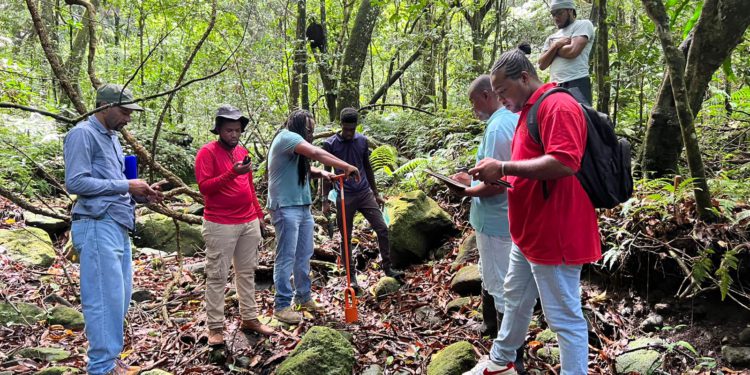Basseterre, Saint Kitts and Nevis, 26 October 2022- Efforts to improve the availability of freshwater
resources and ensure water resource efficiency in Saint Kitts and Nevis are underway thanks to the Food
and Agriculture Organization of the United Nations (FAO), the Caribbean Development Bank, FAO’s
Investment Centre, the Government of Mexico and the Government of Saint Kitts and Nevis.
As part of the ‘Addressing the Water-Energy Nexus in Agriculture’ sub-project of the Mexico-CARICOM-
FAO Initiative “Cooperation for Climate Change Adaptation and Resilience in the Caribbean” or Resilient
Caribbean Initiative in short, FAO together with the Ministry of Agriculture and Ministry of Sustainable
Development have begun the process of validating 40 potential water harvesting and water intake
(drainage) sites across the twin-islands.
Commencing on 11 October 2022 in the area of Fahies, Saint Kitts, the assessment team including
personnel from the GIS Lab of the Physical Planning Department carried out assessment procedures to
determine if the pre-selected sites would be suitable for rainwater harvesting (i.e. the establishment of
rainwater reservoirs) to supply water for the irrigation of crops, livestock and other activities. FAO’s
Investment Centre engaged the International Center for Tropical Agriculture (CIAT)/Alliance Bioversity
International in developing a web-based tool to identify potential rainwater harvesting sites for
irrigation purposes on several Caribbean islands including Saint Kitts and Nevis.
This exercise to validate sites will strengthen the resilience of the island’s water resources. Like most
Caribbean countries, Saint Kitts and Nevis has a small land mass, with limited catchment basins, creating
limitations in the replenishment of freshwater resources. There is a lack of availability of surface water
throughout the year with high dependence on limited amounts of groundwater, which usually requires
fossil fuel energy to extract. The pressure on available natural resources is likely to increase in the near
future due in large part to the intensifying impacts of climate change, which is causing a rise in sea
levels, decreased freshwater quality due to intense storms and more frequent and severe droughts.
To address these issues, the project further promotes technological innovations, such as solar-powered
(micro) irrigation systems to improve water efficiency and management and access to clean and
renewable energy (solar and wind), to increase agricultural productivity and efficiency in water use.
FAO’s National Project Coordinator, Conrad Kelly indicated, “Water shortage in St. Kitts and Nevis is a
major food production constraint. Therefore, identifying and validating suitable sites for rainwater
harvesting is a very important first step toward establishing storage reservoirs to supply irrigation water
for farmers. Once coupled with efficient irrigation systems powered by renewable energy, the expected
outcome would be increased food productivity and food diversity.”
Head of the Crops Division in the Ministry of Agriculture, Ian Chapman emphasised the importance of
this exercise
“These water harvesting and intake sites are within the most vital areas for food production, which are
of critical importance to us as our current production system is over 80% depended on rain-fed
conditions. The rainwater harvesting and water intake sources would improve the availability of food
over a greater period, ensuring access to water during the drier season of production through improved
storage facilities and efficient irrigation systems. Moreover, this venture will allow for more crop
scheduling resulting in more market access over a longer period and ultimately improving the livelihoods
of our farmers. We are most grateful to our partners FAO, the Caribbean Development Bank, the
Government of Mexico and CIAT for this engagement exercise.”
The validation of Potential Rainwater Harvesting Sites on St. Kitts and Nevis will continue throughout
October and is expected to be completed by mid- November. Following field validation in participating
countries, CIAT will finalize the development of the web-based-tool and conduct training for national
Ministry and other institutional staff in the use of the tool for planning of rainwater reservoirs and the
eventual distribution of water to the farms.
For more information:
Firhaana Bulbulia
Communications Consultant
Project: GCP/SLC/MEX/018 CARICOM-FAO-Mexico Initiative “Cooperation for Climate Change
Adaptation and Resilience in the Caribbean”
firhaana.bulbulia@fao.org







